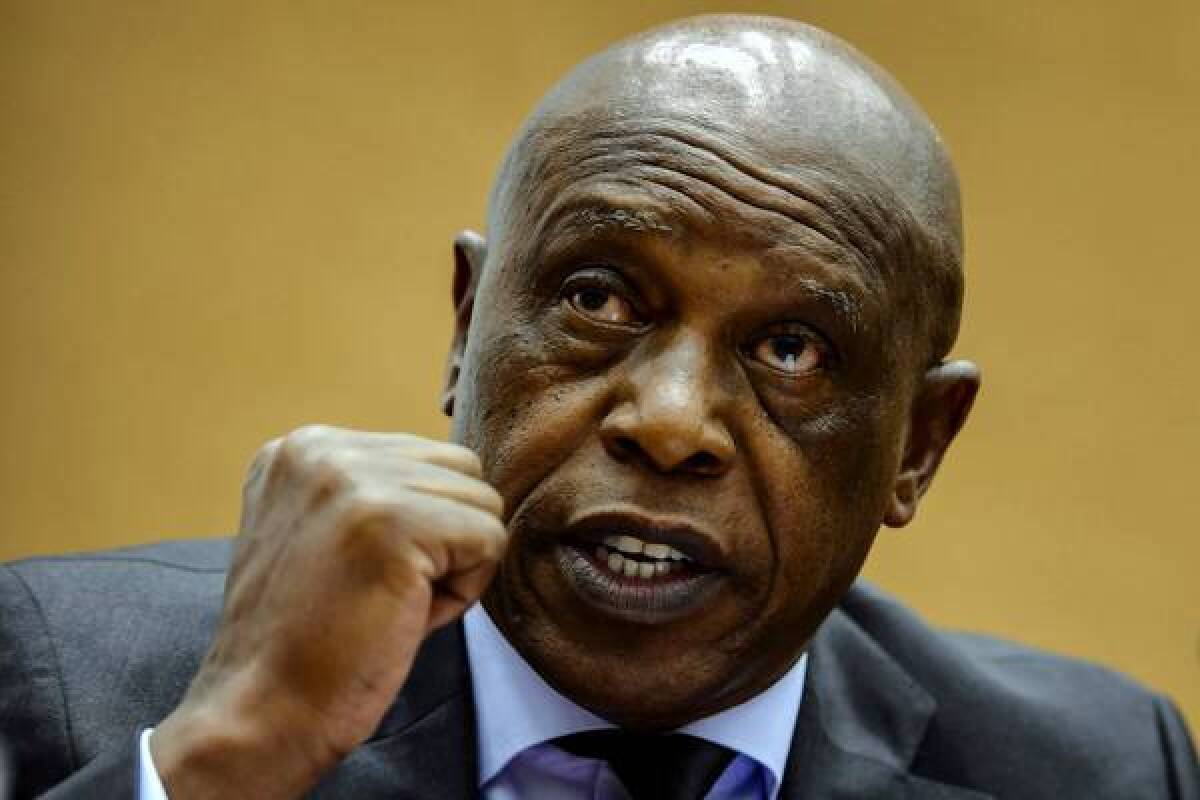South Africa demands apology over U.S. detention of ex-official

- Share via
JOHANNESBURG, South Africa — The ruling African National Congress of South Africa demanded an apology Monday after U.S. officials detained and questioned a South African businessman and former government minister in New York last week.
In an embarrassing hangover from the apartheid era, former freedom fighter Tokyo Sexwale was detained because he was on America’s terrorism watch list.
The names of some anti-apartheid activists who opposed the racist system before South Africa’s first democratic elections in 1994 reportedly remain on the U.S. terrorism watch list. The U.S. didn’t remove former President Nelson Mandela from the list until 2008, years after he retired from public life.
Mandela and other ANC leaders were designated “terrorists” during their struggle against apartheid. Sexwale, like Mandela, was part of the ANC’s armed wing and served time as a political prisoner on Robben Island.
Sexwale, one of South African’s richest men, has interests in mining and energy. In 2011, Forbes listed him among 10 African “millionaires to watch.”
The ANC reacted with outrage at his detention and called for an unconditional apology.
“Comrade Tokyo Sexwale is a former minister of a democratic Republic of South Africa, a decorated freedom fighter, activist and leader of our liberation movement, not a terrorist,” the party said in a statement Monday. “The very fact that the government of America continues to view members and leaders of the African National Congress as terrorists is an affront to the global anti-apartheid movement,” the statement said, adding that current President Jacob Zuma was also an ANC freedom fighter during the anti-apartheid struggle.
ANC members were designated as terrorists by the apartheid government and were barred from entry to the U.S. without special permission from the State Department.
In 2008, then-Secretary of State Condoleezza Rice expressed her embarrassment that she had to provide special permission for Mandela to visit the United States. Later that year, the U.S. Congress passed legislation authorizing that rules rendering visitors “inadmissible due to terrorist or criminal activities would not apply with respect to activities undertaken in association with the African National Congress in opposition to apartheid rule in South Africa.”
There was no State Department response to the ANC call for an apology. An email from a department official did not address whether any other senior ANC members remained on the watch list or whether there were plans to remove any ANC officials who remained on the list.
Trent Duffy, a spokesman for the FBI’s Terrorist Screening Center, which administers the federal government’s no-fly lists, said he was “prohibited by law from commenting on individual cases as the watch list is classified.”
Ebrahim Rasool, South Africa’s ambassador to the U.S., told SABC news that he intervened with the State Department to ensure Sexwale was swiftly released. The businessman returned to South Africa.
The ambassador said the State Department assured him that Sexwale would not face embarrassment in future.
Rasool said the State Department had an override mechanism to prevent the detention of South African government officials traveling to the U.S., but in Sexwale’s case the mechanism lapsed when he ceased to be a government minister.
Sexwale was housing and human settlements minister, but was a leading figure in a party faction that last year opposed Zuma’s reelection as party leader. Zuma retained the party presidency and soon afterward Sexwale was dumped from the Cabinet.
South African media reported that Sexwale was considering court action to force the U.S. to remove the names of former freedom fighters from the terrorism watch list.
Times staff writer Shashank Bengali in Washington contributed to this report.
More to Read
Sign up for Essential California
The most important California stories and recommendations in your inbox every morning.
You may occasionally receive promotional content from the Los Angeles Times.








